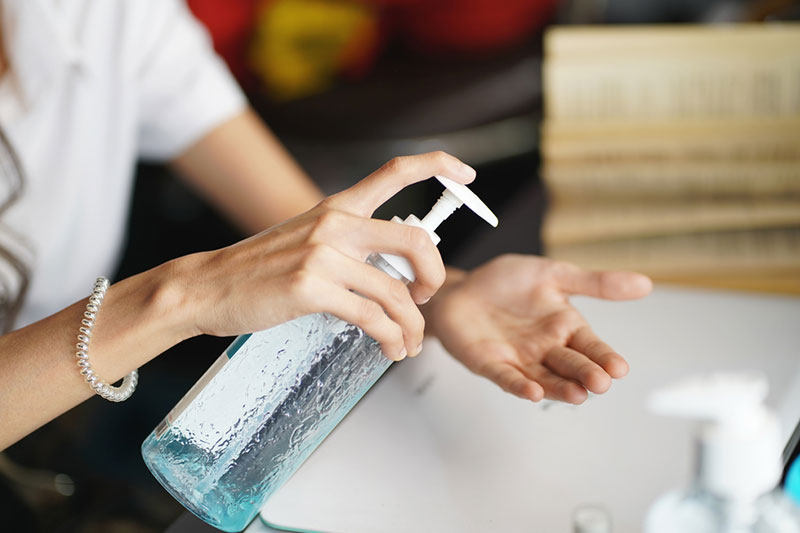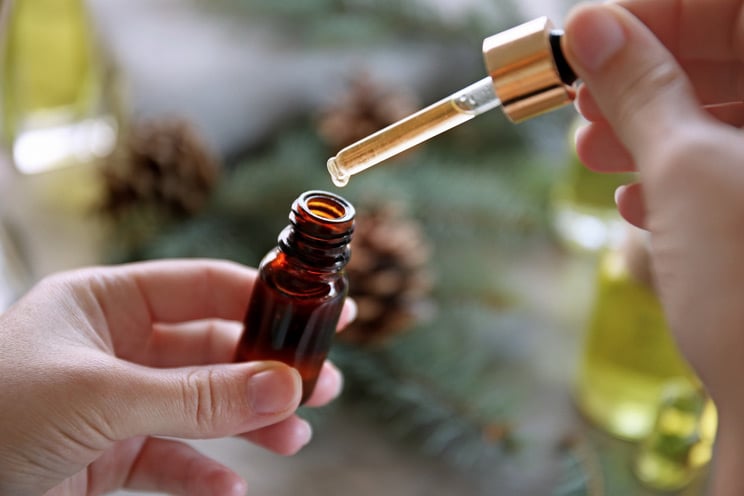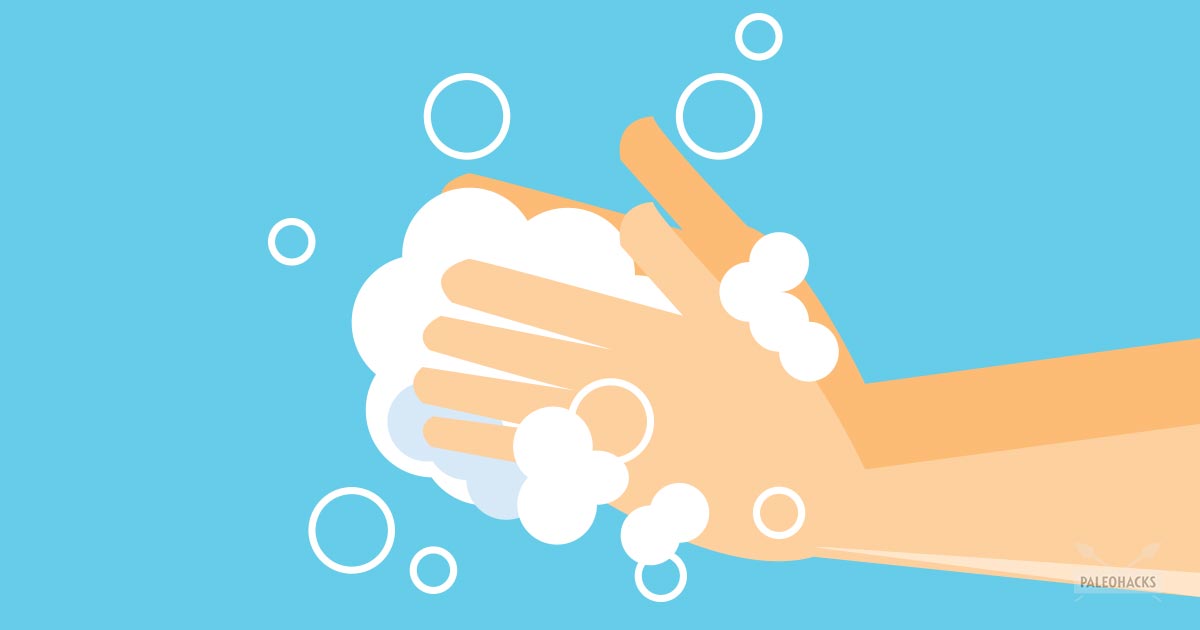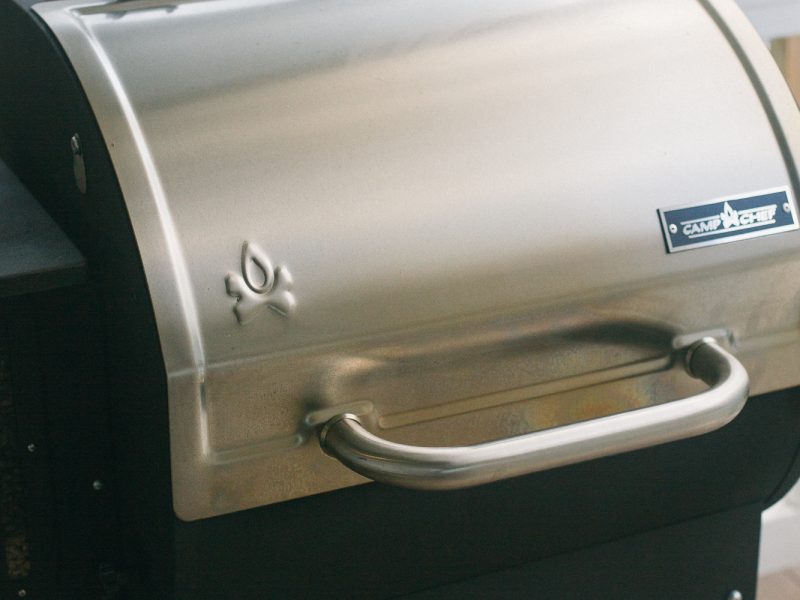Due to the current coronavirus outbreak, handwashing has never been more prevalent or promoted.
While washing is one of the best-recommended ways to keep bacteria and viruses from spreading, too much of it can also lead to hands that become so dry they may actually hurt.
So what can you do to heal the dry, cracked skin on your hands while also following handwashing guidelines? We have you covered below, along with explaining some of the symptoms you may be experiencing, like rashes and cracks.
Want naturally radiant skin? We’ve created a FREE guide to give you the best tips & tricks for natural skincare.
Click here to get your FREE copy of our Skincare Guide!
The Problems With Too Much Hand Washing
Washing your hands, especially after being in public areas, is definitely a must to help slow the spread of germs. However, some handwashing problems may come along with excessive scrubbing, including rashes, contact dermatitis, dry skin, cracked skin, redness, and even burning.
The reason this occurs is mostly due to the nature of soaps, which tend to have a stripping effect. Our skin is equipped with a natural protective oil barrier that helps seal moisture in and keeps pathogens out. (That’s right: our skin’s oil, or sebum, is actually one of our first lines of defense against invaders!) Commercial soaps contain chemicals that, while technically they “clean” the area, strip the skin of this barrier. Hot water and scrubbing exacerbate this effect, exposing the delicate underlayers of skin to unnatural chemicals and other harsh solvents.
While we definitely recommend keeping up on the washing, there are several things you can do to stop excessively drying out your hands, and allow them to heal while keeping clean.
How to Wash Your Hands to Avoid Issues
Choose a quality natural soap
One of the best things you can do to reduce irritation, rash, and dryness from handwashing is choosing a quality soap. Fragrances and chemicals in commercial soap brands are known irritants. And, along with other common household items, have been studied for their significant toxicity to human health.
When it comes to healthy products, especially personal care products like soaps, Claudia Miller, an allergist and immunologist at the University of Texas Health Science Center at San Antonio, states, “The best smell is no smell”. (1)
Be sure to look for a soap brand that contains only natural ingredients, and doesn’t include the term “fragrance” or “parfum”. If scented, make sure it is scented with essential oils like citrus or lavender.
Wash at critical times
It can be tempting to keep washing your hands whenever the thought strikes, especially when it has become a habit to wash more often than usual. However, it is recommended to wash only at critical times. This includes after being out in public, and especially before ever touching your face.
After you wash your hands when out, it’s a good idea to watch what you touch before you get home. Otherwise, something like touching another doorknob after washing your hands at the grocery store could lead to needing to wash your hands again once you get home.
Use sanitizers wisely

Sanitizers can be handy for those times like above when you’re leaving a store and getting in your car. You can sanitize your hands after touching the last doorknob, then wash your hands once you’re home and before touching your face.
Like soaps, it’s also a good idea to look for natural hand sanitizers with no fragrance and minimal synthetic ingredients aside from alcohol. Also, use these sparingly since they can strip and dry out the skin as well.
Find out more in Hand-Washing vs Sanitizers: The Best Way to Kill Germs
Use gloves when washing dishes
Using gloves when doing other washing activities, like dishes, to avoid drying them out further. And also consider using natural dish soap.
Best Handwashing Practices
How to wash your hands
The Centers for Disease Control and Prevention (CDC) states you should scrub your hands for at least 20 seconds to effectively curb the spread of germs. A good practice you might remember from childhood is to sing “Happy Birthday” as you wash.
Pat dry, don’t rub
Rubbing the skin dry with a towel can further irritate the skin, especially if it’s already cracked. Instead, gently and lightly pat dry with a soft towel.
Use warm water
It is recommended to use hot water when washing, but this doesn’t mean it needs to be scalding. Hot water can turn up the dryness, while warm water can be beneficial and result in less irritation.
Apply moisturizer

To re-establish the protective moisture barrier of your skin, you definitely want to apply a moisturizer after washing. However, the same advice applies as with soaps: make sure the moisturizer is fragrance- and chemical-free, and oil-based.
Chemicals in lotions can further irritate your skin and exacerbate rashes. While all-natural, oil-based moisturizers soothe the skin and mimic your skin’s natural oil, reducing the risk of irritation. Think moisturizers with a base of olive oil, shea butter, or even coconut oil or coconut butter.
Other great oils include:
- Jojoba oil
- Almond oil
- Sesame oil
- Rosehip oil
Apply these after every wash to rehydrate.
Try this Healing Hand Cream with Jojoba Oil it’s easy to make and an intensive moisturizing treatment for dry, cracked hands.
The Bottom Line
Handwashing is crucial for helping to slow the spread of viruses and other pathogens. However, excessive washing can lead to handwashing problems like dryness, rashes, and burning. Natural soaps and moisturizers can soothe overwashed skin and restore its natural protective barrier.
Read This Next: 8 Natural Foods That Moisturize Your Skin From the Inside Out


